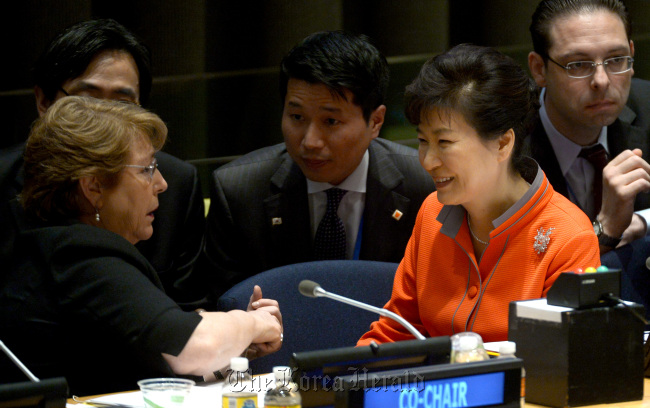Working beside society’s elite, they fly hundreds of thousands of miles every year on charter planes. They speak about pressing brainteasers with the top actors on the world stage. They have access to the heavily fortified Cheong Wa Dae and its inner workings, as well as those of other presidential offices around the globe.
Despite their seemingly coveted call of duty, almost the only time they make the headlines is when they blunder. At times, they are bewildered by the convoluted, highfalutin language of the politicians sitting next to their client even before composing their nerves in an environment that requires intense concentration.
They are the president’s interpreters.

Lee Sung-hwan (center), an assistant presidential secretary for foreign affairs and President Park Geun-hye`s execlusive English interpreter, sits between Park and Chilean President Michelle Bachelet during a U.N. session in New York on Sept. 27. (Yonhap)
While well-trained specialists provide professional services, many of them are career diplomats who boast language skills and knowledge about sensitive diplomatic issues. Whatever their background, they are considered some of the best in the field of interpretation.
“If you are preparing for a meeting, you want to fully understand what will be discussed and thoroughly check on the English translation of related technical terms. Once the session kicks off, you just focus on interpreting every word said by both sides without missing one,” says Seoul’s Ambassador to the Netherlands Choe Jong-hyun, who was an English interpreter for former Presidents Kim Young-sam and Kim Dae-jung from 1996 to 2000.
Bae Sun-kyung, who served as a Russian interpreter for President Park Geun-hye and her predecessors Lee Myung-bak and Roh Moo-hyun, also stressed the significance of delivering accuracy and context, for which additional explanations are indispensable at times.
“Precise representation is far more essential at summits than dinner and other relatively casual settings, especially if the president needs to convey a strong, clear message. I take caution not to be inclined to personal feelings and exercise self-control,” says Bae, who is now a second secretary at the South Korean Embassy in Belarus.
“But I often find it necessary to elucidate contextual meanings. You may think of it as sort of an interference that could damage the accuracy, but it is not. You would never know when you end up interpreting for someone who has little to no idea about the six-party talks, Cheonan corvette sinking, or the Sewol ferry tragedy.”
Her point was echoed by a professional English interpreter who served Lee and, before that, prime ministers. “As I usually represent my client only, I was trying to read his or her intentions and goal and fit the mood,” she said, asking anonymity due to the sensitivity of her work.
The intensity of the atmosphere and the high-stakes agenda are so stressful in themselves that it can cause severe anxiety coupled with health problems in the lead up to the events, the presidential interpreters say. In Bae’s case, it is indigestion, menstrual irregularity, insomnia and acne, among others.
Yet the experience offers a crucial chance to delve into various diplomatic issues and thus improve their vocational capability, while seeing into the minds of their own president and other world leaders on major flashpoints, they note.
“After the meeting ended, sometimes my head went blank and I just could not remember anything that was discussed in the past two hours,” said Chung Eui-hae, director for ASEAN cooperation at the Foreign Ministry who interpreted from Korean to English for Roh.
“It involves a great deal of tension and stress, yes, but the moments of complete immersion make for a stunning experience.”
Adding to the already high-pressure backdrop is the nearly flawless command of foreign languages possessed by some commanders in chief.
Kim Dae-jung was known to have taught himself English and Japanese. Kim Young-sam is also a fluent Japanese speaker. The incumbent Park, who has shown her English and other language skills through speeches and other occasions, drew media attention after fixing her interpreter’s use of the term “party congress” to “party convention” during a meeting with German Ambassador Rolf Mafael here in early 2013.
Cho Sei-young, a former director general for Northeast Asia affairs at the ministry and Japanese interpreter for the two Kims, says their own proficiency magnified the intensity of his service.
In one episode, as he rode in a car after a summit in 1998 in Tokyo with then-Prime Minister Keizo Obuchi, Kim Dae-jung praised his work and even advised him to “enrich” his vocabulary such as by reading Japanese novels as the deceased president did himself while in prison.
“They knew whether my interpretation was correct or not, so pressure was several times higher for Japanese interpreters,” says Cho, who now teaches international relations at Dongseo University in Busan.
As professional interpreters have taken over a large part of their task, however, the burden on younger diplomats ― and their overall language ability and self-improvement efforts ― have sharply declined in recent years, he says.
Bae also expressed hope that the Foreign Ministry would create a division to boost interpretation functions and nurture resources in the long term through training and education.
“With the president or premier being the top diplomat of a country, repeatedly listening to their remarks at arm’s length allows you to look into his views on real diplomatic issues, and could create enormous synergy when you prepare the materials for the next summit or handle the issues yourself,” Cho adds.
“Back then I was only a secretary-level servant but I took great pride in having an understanding of major diplomatic issues that is no less than that of senior diplomats.”
By Shin Hyon-hee (heeshin@heraldcorp.com)






![[Graphic News] More Koreans say they plan long-distance trips this year](http://res.heraldm.com/phpwas/restmb_idxmake.php?idx=645&simg=/content/image/2024/04/17/20240417050828_0.gif&u=)